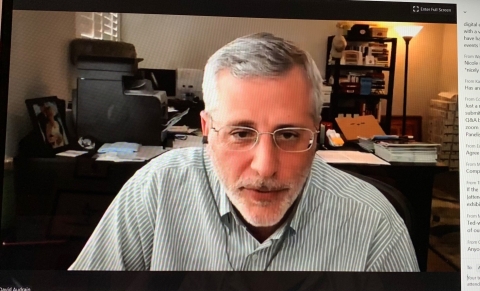SISO Town Hall Gathers Trade Show Leaders to Discuss COVID-19 Impact

Like all in-person events right now, the Society of Independent Show Organizers had to cancel its’ annual SISO CEO Summit, which gathers executives from the for-profit global trade show industry annually and was meant to run this week in Dallas at the Four Seasons.
SISO’s Executive Director David Audrain said, “SISO feels strongly, now more than ever, we need to come together as a community, share our experiences and pivots, and get answers to burning questions.”
To still make that happen, SISO held a virtual Town Hall March 31, with Audrain moderating and panelists that included Greg Topalian – Clarion/UX; Douglas Emslie – Tarsus Group; Herve Sedky – Reed Americas; Cassandra Farrington – MJBizCon.
HERE is a recording of the SISO Town Hall.
All the panelists had events that were impacted as a result of COVID-19, with Emslie adding that Tarsus Group, with 180 events globally in its portfolio, has postponed more than 40 of them.
“So far, we’ve only canceled one show in China,” he added.
With shows being postponed and canceled, everyone on the panel said that attendees and exhibitors overall were supportive of the decision.
Topalian said Clarion was offering some incentives for exhibitors to roll over their investments into new dates for shows that are impacted.
On the attendee side, he added that they had a consumer event where people already had bought tickets and they gave them the opportunity to ‘stay in’ for the next edition or get a refund. “Only 15 percent said, ‘I want my money back,’” Topalian said.
Most supplier partners also are working hand in hand with the shows as well. “Everyone is going through the same experience,” Emslie said. “There have been one or two problems with partners. You can’t be asking for the government for money on one side and then playing hardball with your customers.”
Audrain encouraged SISO members to contact him if they were having any problems with their supplier partners.
Farrington added of her company’s experience, “It’s a mixed bag. Some (suppliers) are on board and some are fighting for their own survival and treating us accordingly.”
The supplier community is being hit hard by this crisis. Sedky said that at Reed Exhibitions they have a detailed plan on how to assess the resiliency of their partners that included asking questions such as – “How difficult would it be to switch to another supplier?”, and “If the supplier cannot deliver, what percentage of attendees would be impacted?”
Those questions – and others – are then ranked - high, medium or low. “If it’s high, we look at them as a critical supplier,” Sedky said.
One of the most buzzed about topics with all the live events being canceled/postponed right now is whether to have a virtual offering, and if so – what kind?
Topalian said in places where Clarion has a media component already, they are having success with holding webinars that are attracting good numbers of people and revenues.
In addition, they are virtually connecting buyers and sellers and facilitating online product demos.
He added that they are considering “what do these attendees need right now and put it in front of them, instead of trying to (just) sell it.”
Emslie said Tarsus is focusing on some of its existing digital offerings. “We have online education with our medical business that’s seeing an increased take up right now,” he added.
Looking at potential challenges once live shows do start up again, Emslie said his concern was all the shows that were postponed in the first half of the year now scheduled in the last four months of 2020.
“It will be a challenge with suppliers,” he added. “It’s very important to keep in close contact with the general service contractors so you are not the one left without a chair when the music stops.”
The million-dollar question was when did the panelists think shows would be able to be open again?
Farrington said she thought it would be at least 4-6 weeks out to “getting past this murky crystal ball area until we can see past this.”
Emslie said that Tarsus has 250 employees and 8 offices in China, all but the one in Wuhan now is open.
“Our first event in China is in June. That is encouraging,” he added. “If the pattern follows through to the West, we’re looking at September.”
Audrain pointed out that pre-COVID-19, Clarion, Reed and Tarsus all were actively acquiring new properties.
Now, however, deals are on hold, but Topalian said his company is looking at where they can partner, particularly with associations that may have had their annual events canceled.
“There is a lot of tough stuff going on right now,” he added. If Clarion can help another show out by collocating or in some other way, then Topalian said, “Frankly, to me, it’s the right thing to do.”
Emslie added about M&A, “I think everyone’s in the same place. M&A has ground to a halt right now. Everyone is focused on their business and opportunities going forward are long term.”
Ending the Town Hall, Sedky said that “uncertainty creates anxiety” and encouraged everyone to focus on the people around them, as well as their own mental and physical wellbeing.
SISO plans to hold more Town Halls in the future. In the meantime, HERE is a link to the association’s COVID-19 resources.


Add new comment